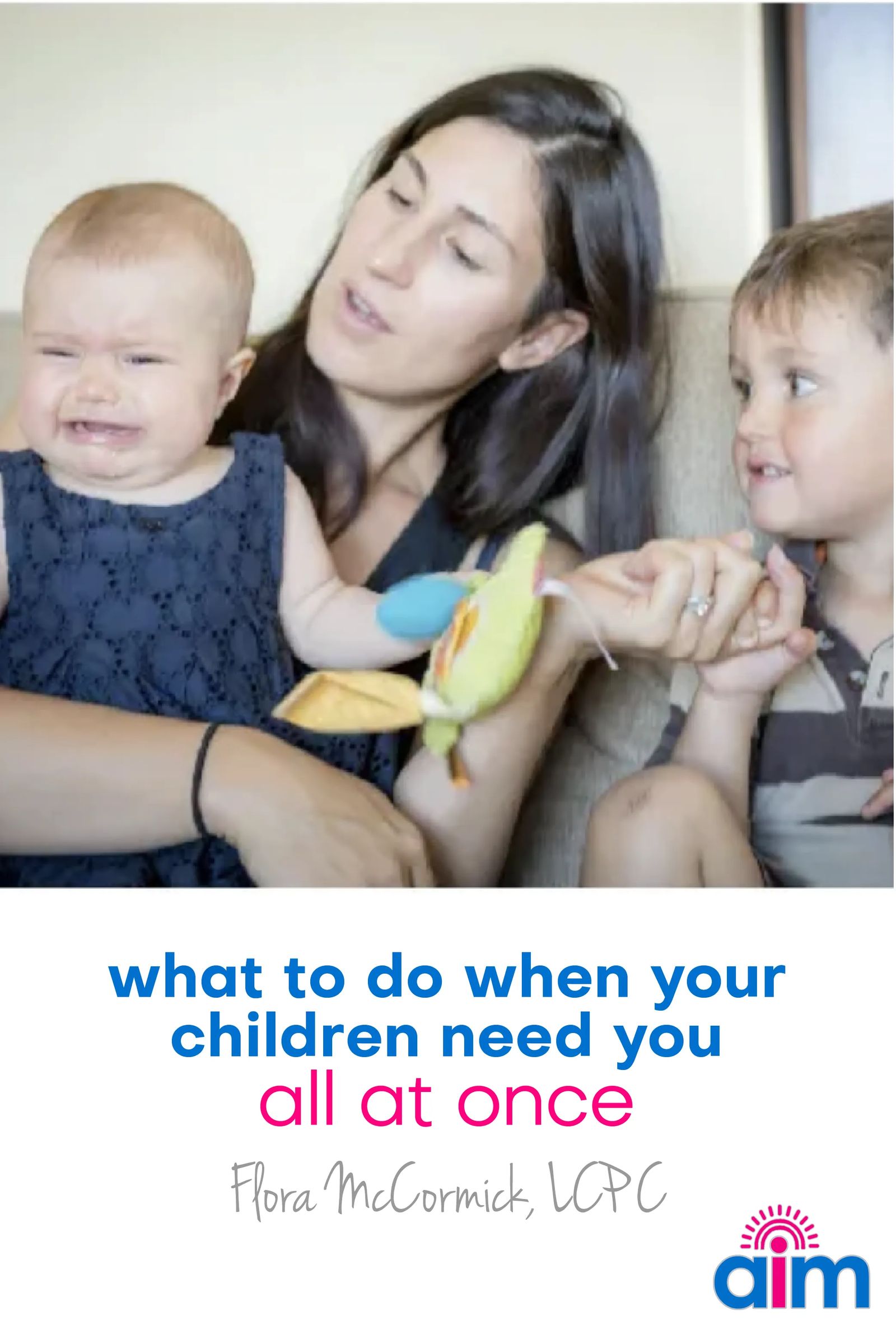Parents and Teachers: What To Do When All Your Children Need You All at Once

I must confess that when my second child was born, I was nervous about this new world of having two children. It already felt somewhat overwhelming trying to provide an at-home Montessori environment for my one child. I also worried that I wouldn't be able to offer an adequate amount of validation or listening to either child if the other needed something at the same time. This stemmed from the fact that before having children, I often got questions from my parent-coaching clients about how to parent more than one child at a time. I would offer them suggestions to improve their relationship with their child or improve behavior issues in the home, and they would say, "But that just isn't possible when you have two or more children who all seem to need you at once."
So, how do you manage the varying needs of multiple children at once? Here are a few tips that can be effective for parents and teachers:
It's ok to ask one child to wait.

1. Be human, with human limitations. It is actually great for our children to see us have limitations, because it gives them an opportunity to practice delayed gratification. Catering to your child's every need is not loving; it teaches them entitlement. I'll never forget one mother's advice to me right before I had my first child. She said, "I regret that when my two boys were young, I didn't really show them that I was human and I had needs too. I was always willing to get up to pour a glass of milk, or get their sweatshirt from upstairs or drive them to three different play dates, when I really wanted to sometimes say 'No. I cannot do that for you right now'. Unfortunately, my actions taught my boys to treat me like my needs didn't matter and that their needs always came first.”
This advice has stuck with me, and has had two key benefits:
- I am more patient and my stress is decreased when I’m not running around to meet my child’s every request.
- My child is given an opportunity to practice delayed gratification, which studies have shown impacts a child’s academic success and relational happiness throughout life (https://www.apa.org/helpcenter/willpower-gratification.pdf).
When I had my second child and had to nurse the baby, while also being asked to come outside and watch my three-year-old ride bikes, I didn't just distract him. I explained that I needed a moment because it wouldn't be comfortable for me to try to nurse sister while sitting out in the cold. I could say, "I need a warm comfy spot (just like I gave you when you were a baby), to give Eva her milk. Then I'll be happy to come out with sister and watch you ride bikes." Likewise, if I sit down to finally have a cup of coffee after getting the children breakfast, and my youngest spills her milk, I don't jump up to take care of it. I have made sure washcloths are in a location she can reach and I only offer help I am able to give in that moment, while still honoring my need to take a second to finish and enjoy my coffee. This habit helps me maintain patience throughout the day, and helps my children develop the ability to delay gratification.
Sometimes I get carried away, and try to "do it all".
2. Involve the children in comforting or helping one another. You don't have to be the super hero bouncing from child to child, helping them with every problem all by yourself. When you do this, you rob the other children of the opportunity to grow empathy and social skills related to helping a friend or loved one. If one child is having a problem, and another child is trying to get your attention, involve that second child in the problem-solving.
For instance, if I'm comforting my 1 ½-year-old after a fall, yet my son says he needs help building with his blocks "right now!" I say, "I'll be happy to come over and build with you in about five minutes. Can you see that Eva is so sad right now? She hurt her foot when she slipped. She always seems to cheer up when she gets a hug from her amazing super brother. Maybe one of those would help right about now. What do you think?" My son (four) loves to be the hero for his sister, so this often gets both children into a happier space and then move onto the next interest together

3. Compliment your children evenly. When a baby comes into a family, it's very easy for that baby to get the majority of the compliments from family and friends. "Ooooooh, look at her cute smile. She is just so happy". Meanwhile, the older child(ren) might be looking down, feeling left out. In moments like this, I seek to respond to the compliment with, "I know. She is so happy because she has the most amazing older brother. She is so lucky to have such a kind and sharing and fun brother." I notice friends and family follow my lead, and then begin to give the older child some compliments too. This is a great way to buffer against baby jealousy.
If you would like to learn more about supporting the emotional needs of your children, check out our 4-week online Child Development Course perfect for Parents or Teachers. You will learn the true needs of the child, how to manage/avoid toddler temper tantrums, how to help your child find peace, harmony and purpose, and more!

Flora McCormick has been a Licensed Clinical Professional Counselor & Parenting Coach for 10 years, she helps parents of young children to calm the chaos, and revive connection and cooperation. Her strategies are sustainable for busy parents, using kindness & firmness at the SAME time. The result is an improved relationship with your child, where you can enjoy being a parent.






















